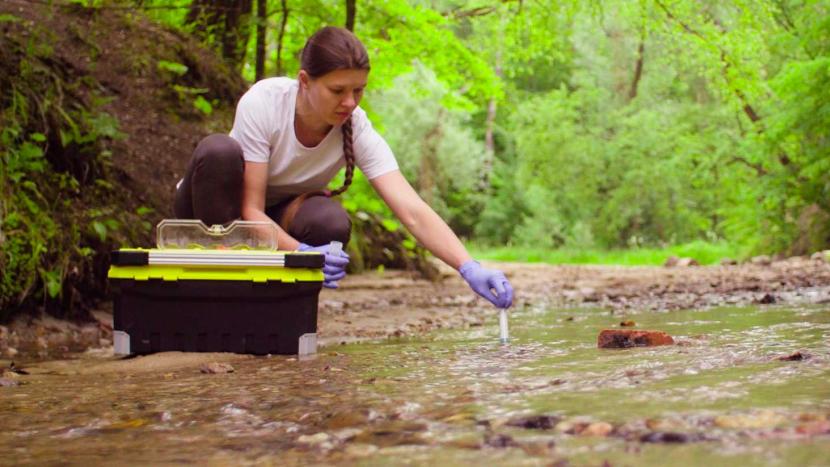
November 2023
What Can You Do With An Environmental Science Degree?
Environmental Science is an increasingly popular field with broad career potential. Depending on your specific focus, day-to-day responsibilities could include fieldwork, conservation, lab work, wildlife management, consulting, construction site appraisal, report writing, academia, environmental modeling, advocacy, and more.
Green jobs are expected to grow faster than the national average through 2030, according to the U.S. Bureau of Labor Statistics. If you're interested in entering a diverse field that has the potential to make a positive impact, continue reading to discover what you can do with an environmental science degree.
What is Environmental Science?
Environmental science is an interdisciplinary field that studies the physical, biological, and chemical aspects of the environment and its effects on specific organisms. In simpler terms, it examines the interactions between humans and the environment. These interactions encompass the physical, biological, and social sciences. Environmental science aims to understand the natural systems of the Earth, the impacts of human activities on these systems, and the development of sustainable solutions to environmental problems.
How to enter the environmental science field
You must have a bachelor's degree in environmental science or a related natural resource field for most entry-level jobs. A master's degree is not required but is recommended to advance in the field. The University of Arizona Online offers a Bachelor of Science and Master of Science degree in environmental science.
A bachelor's degree in environmental science lays the foundation for creating your path. Learn effective communication, leadership, and issues regarding our Earth. This bachelor's offers a diverse and practical skillset in science, communication, critical thinking, and leadership.
Through this master's program, you'll be prepared to take on environmental issues and compliance in interdisciplinary teams. Environmental core courses deal with the local, regional, and global aspects of environmental science and their interrelatedness, intending to provide you with sought-after soft skills.
What jobs can you do with an environmental science degree?
Environmental science is a diverse field that can include becoming a high school science teacher and a marine biologist. No matter the career, your education in environmental science will prepare you to make a difference and protect the environment and the health of our planet. You may clean up polluted areas, advise policymakers, or work within the industry to reduce waste. Here are some environmental job profiles and the average salary for the role.
Environmental manager
An environmental manager oversees compliance with environmental regulations to reduce their employer's overall carbon footprint and waste output. Common areas include clean water, pollution, air quality, and waste related to an organization.
National median salary: $74,283 per year
Environmental lawyer
Environmental lawyers specialize in the legal aspects of land, air, and water. These lawyers may represent clients concerning water law, climate change law, and land management. They may lobby to enact new environmental compliances and regulations and to protect ecosystems, agriculture, and biodiversity.
National median salary: $74,337 per year
Environmental biologist
Environmental biologists may collect various environmental samples to study, analyze, and create plans to aid in the protection of different life forms. They assess current ecological conditions and determine the impact that various factors are having on the environment.
National median salary: $75,756 per year
Environmental engineer
Environmental engineers design systems that promote green design, such as systems to convert waste to energy and water reclamation. They may also ensure that various facilities maintain permits and standard operating procedures related to the environment.
National median salary: $79,617 per year
Water quality scientist
Water quality scientists provide solutions for maintaining and improving water quality and report water quality issues such as pollution. They test and analyze water taken from surface water, groundwater, and drinking water. They typically work for the government, non-profit environmental agencies, and commercial businesses.
National median salary: $87,297 per year
Recommended skills for environmental science careers
While earning an environmental science degree is a must to enter the industry, it's also imperative that you possess and highlight the skills you have gained from your experience and education. The following are just some of the skills and knowledge that will give you an edge in the environmental science career field:
- Data-gathering
- Data analysis
- Science and math
- Conducting quantitative research
- Environmental sampling
- Deductive reasoning
- Writing scientific research papers
- Identifying environmental issues
- Proposing environmental solutions
- Critical thinking
- Communication
- Time management
- Collaboration
- Problem-solving
Is environmental science a good degree?
If you're interested in the environment and want to be a part of creating and/or advocating solutions to the many problems the planet is facing, then earning an environmental science degree is a good fit for you! If you enjoy observing, researching, analyzing, and solving problems, you will excel in this field. Employment of environmental scientists and specialists is projected to grow 6% by 2032, and about 6,900 openings for environmental scientists and specialists are projected each year, on average, over our decade.







